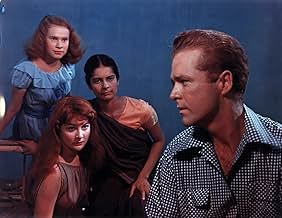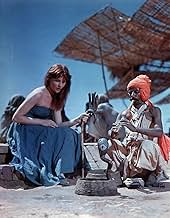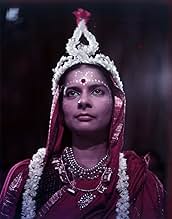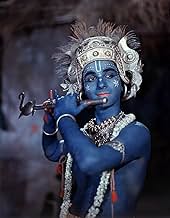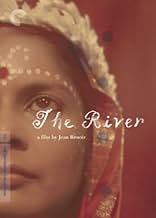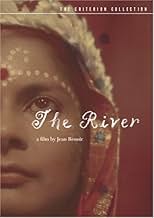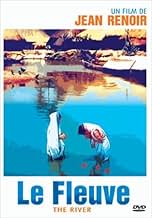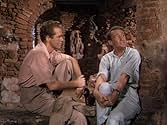IMDb-BEWERTUNG
7,4/10
7240
IHRE BEWERTUNG
Füge eine Handlung in deiner Sprache hinzuThe growing pains of three young women contrast with the immutability of the holy Bengal River, around which their daily lives unfold.The growing pains of three young women contrast with the immutability of the holy Bengal River, around which their daily lives unfold.The growing pains of three young women contrast with the immutability of the holy Bengal River, around which their daily lives unfold.
- Nominiert für 2 BAFTA Awards
- 3 Gewinne & 4 Nominierungen insgesamt
June Tripp
- Narrator
- (Synchronisation)
- (as June Hillman)
Nimai Barik
- Kanu
- (Nicht genannt)
Richard R. Foster
- Bogey
- (Nicht genannt)
Jane Harris
- Muffie
- (Nicht genannt)
Jennifer Harris
- Mouse
- (Nicht genannt)
Trilak Jetley
- Anil
- (Nicht genannt)
Sajjan Singh
- Ram Singh - The Gateman
- (Nicht genannt)
Penelope Wilkinson
- Elizabeth
- (Nicht genannt)
Cecilia Wood
- Victoria
- (Nicht genannt)
Empfohlene Bewertungen
10dfmlsf
There is something special about this movie. In fact, to say there is something special does not tell much, and it could be equally applied to hundreds of films which are much less special than this. So let's start again. I had never seen a film like "The River" before. Thanks to the Spanish TV program "Qué grande es el cine" I discovered this piece of Art created by a major artist: Renoir. Some of my other favourite movies are similar in some aspects to others. And so, "North by Northwest" resembles other thrillers with Cary Grant; "A Touch of Evil" is a moral fable and also a nightmare which reminds a bit of "The Night of the Hunter", and so on. But "The River" reminds me of nothing I have seen on a screen. It has to do with ethics and with life. It has to do with balance, with understanding human nature. I think this film has everything which can be told in a film. Absolutely everything. I believe this film reflects an attitude towards life and towards art. So I got it finally! This film is if anything an attitude. Once you have seen, you feel better, you know more about life, your perspective has changed. It is a ray of light. I should be compulsory in High School and everywhere.
Jean Renoir embraces Technicolor for the first time in his adaptation of Rumer Godden's coming- of-age novel THE RIVER, with the latter collaborating on the screenplay. The story takes place in Bengal, India, a teenage girl named Harriet (Walters) is the eldest child of a middle-class British family living near the riverbank of Ganges, her father (an one-eyed Knight) runs a jute mill, and her mother (Swinburne) is expecting a child no. 7.
It is a carefree scenario, growing up in the natural inculcation of an exotically profound Hindu culture while carrying on an genteel upbringing, sometimes, it conspires to be a false or at least parochial impression of the land and its people, which doesn't take up too much space in the story-line, the only native Indian who has a speaking part is Nan (Mukerjee), the family's convivial but gossipy nanny, and the rest sustains as an ethnic curiosity to meet the Westerners' eyes, although beguilingly and entrancingly so, after all, what we are allowed to watch is the smugly colonial tip of the Indian iceberg.
The plot revolves around Harriet's budding affection towards the guest of their neighbor Mr. John (Shields), an one-legged American Captain John (Breen), who takes his time in lolling on a foreign land, to find some peace with his battlefield past and physical disability, look for a new resolution for life. As John is the only eligible white young man on the market, to her chagrin, a besotted, but fairly plain-looking Harriet has a losing game against her rival, the maturer and more zaftig Valerie (Corri), by the way, a British girl too is also her best friend. And throughout this picturesque film, it is Harriet's voice-over that guides viewers traversing her prepubescent triviality (poems, indeed), to listen to her inner voice, to sympathize her unrequited love, to find empathy in this garden-variety tale.
Wielded as an emotional clincher, a tragic incident materializes as one downside of having a brood of many caused by adult negligence, but here also emanates a disquieting undertow to pinpoint the virulence of a foreign society with a local boy standing by as an unwary abetter. And a cheesy solution to get it over is taking the pro-procreation flag, babies are being borne all the time.
The cast is mixed with adult professionals and amateur players, but comes off barely adequate, a major gripe is the narrative ellipsis in the story of Melanie (Radha), the mixed-race daughter of Mr. John, who stands out (there is not much competition though) with a massively pleasurable Ganesha-courting dancing sequence, but whose dislike of herself, waffling identity never been considerably mapped out as a pre-eminent counterpoint of Harriet's more orthodox background.
So, all above sounds like a pejorative critique against a film who has earned a hallowed reputation since its genesis, yet, it is as plain as the nose on one's face, the picture's eye-catching glamour and aural accompaniments are undeniably supreme, technologically speaking. And it is smart enough for Mr. Renoir to treat it as a philosophical prose other than a heady narration of banal proceedings, only a 60-odd-year later, its allure fades away slightly due to the original novel's awkward stance on a colonized land and Renoir's condoning deference.
It is a carefree scenario, growing up in the natural inculcation of an exotically profound Hindu culture while carrying on an genteel upbringing, sometimes, it conspires to be a false or at least parochial impression of the land and its people, which doesn't take up too much space in the story-line, the only native Indian who has a speaking part is Nan (Mukerjee), the family's convivial but gossipy nanny, and the rest sustains as an ethnic curiosity to meet the Westerners' eyes, although beguilingly and entrancingly so, after all, what we are allowed to watch is the smugly colonial tip of the Indian iceberg.
The plot revolves around Harriet's budding affection towards the guest of their neighbor Mr. John (Shields), an one-legged American Captain John (Breen), who takes his time in lolling on a foreign land, to find some peace with his battlefield past and physical disability, look for a new resolution for life. As John is the only eligible white young man on the market, to her chagrin, a besotted, but fairly plain-looking Harriet has a losing game against her rival, the maturer and more zaftig Valerie (Corri), by the way, a British girl too is also her best friend. And throughout this picturesque film, it is Harriet's voice-over that guides viewers traversing her prepubescent triviality (poems, indeed), to listen to her inner voice, to sympathize her unrequited love, to find empathy in this garden-variety tale.
Wielded as an emotional clincher, a tragic incident materializes as one downside of having a brood of many caused by adult negligence, but here also emanates a disquieting undertow to pinpoint the virulence of a foreign society with a local boy standing by as an unwary abetter. And a cheesy solution to get it over is taking the pro-procreation flag, babies are being borne all the time.
The cast is mixed with adult professionals and amateur players, but comes off barely adequate, a major gripe is the narrative ellipsis in the story of Melanie (Radha), the mixed-race daughter of Mr. John, who stands out (there is not much competition though) with a massively pleasurable Ganesha-courting dancing sequence, but whose dislike of herself, waffling identity never been considerably mapped out as a pre-eminent counterpoint of Harriet's more orthodox background.
So, all above sounds like a pejorative critique against a film who has earned a hallowed reputation since its genesis, yet, it is as plain as the nose on one's face, the picture's eye-catching glamour and aural accompaniments are undeniably supreme, technologically speaking. And it is smart enough for Mr. Renoir to treat it as a philosophical prose other than a heady narration of banal proceedings, only a 60-odd-year later, its allure fades away slightly due to the original novel's awkward stance on a colonized land and Renoir's condoning deference.
A really glorious, spellbinding movie. Filmed in Bengal, India, on the Ganges, it captures the essence of India, the timeless quality of life on the Ganges, without being patronizing.
This is a coming of age movie about three teenage girls, two British and one Anglo-Indian, and how their lives are affected by the arrival of a one-legged American war veteran. It's very easy to fall into sentimentality in a movie like this, but Renoir avoids this obvious pitfall. Though I have to say, I found this film very moving.
It helps that this movie is filmed in Technicolor, and is one of the best uses of Technicolor of that era.
Some of the performers were amateurs, including the actor who played the veteran and some of the children, but overall the performances are outstanding. A fine, low-key performance by Esmond Knight. This was the only film for Patricia Walters, who played Harriet, and Thomas Breen, the war veteran who played Captain Jack, never made any other movies. Watch for Arthur Shields, the brilliant Irish actor, as father of Nan.
This is a coming of age movie about three teenage girls, two British and one Anglo-Indian, and how their lives are affected by the arrival of a one-legged American war veteran. It's very easy to fall into sentimentality in a movie like this, but Renoir avoids this obvious pitfall. Though I have to say, I found this film very moving.
It helps that this movie is filmed in Technicolor, and is one of the best uses of Technicolor of that era.
Some of the performers were amateurs, including the actor who played the veteran and some of the children, but overall the performances are outstanding. A fine, low-key performance by Esmond Knight. This was the only film for Patricia Walters, who played Harriet, and Thomas Breen, the war veteran who played Captain Jack, never made any other movies. Watch for Arthur Shields, the brilliant Irish actor, as father of Nan.
After a family tragedy, an adolescent girl blurts out angrily at the dinner table, "We just go on as if nothing has happened". "No", her mother responds, "we just go on". The River, Jean Renoir's first color film, is about going on -- the ebb and flow of life that mirrors the path of the sacred river Ganges that flows nearby. Filmed on location in India, The River is a sumptuously beautiful film that was called by Martin Scorsese ""one of the two most beautiful color films ever made" and one of his "most formative movie experiences." The film has been brought to life magnificently in a new Criterion DVD that contains an introduction by Jean Renoir, an interview with Scorsese, and a biography of author Rumer Godden, who grew up in India and whose work formed the basis for Powell and Pressburger's Black Narcissus (1947).
Set in India at the time of independence, its themes are universal: the feeling of being an outsider, of running away from unpleasant situations, and the hopelessly romantic stirring of adolescent love. While the film reflects the point of view of a British colonial family, it is respectful of the surrounding culture and pays homage to Hindu and Buddhist traditions through stories, documentary footage, and dance sequences. Harriet (Patricia Walters) is the adult narrator who looks back on her days as an adolescent. About thirteen in the film, she lives with her four sisters and brother Bogey in a colonial house in India that looks out upon the Ganges. Renoir's camera captures the energy and rhythm of life on the river: its peddlers, ships, markets, people coming and going, the crowds, everything in constant motion juxtaposed with the timeless tranquility of the river.
Harriet's father (Esmond Knight) who lost an eye during the war, runs a jute manufacturing plant while his pregnant wife (Nora Swinburne) takes care of the house, assisted by governess Nan (Suprova Mukerjee). When a young American named Captain John (Thomas E. Breen) comes to visit his cousin Mr. John (Arthur Shields) after losing his leg in the war, his dreams of being left alone are short lived. Harriet becomes infatuated with Captain John but has to contend with two other female admirers: her older friend Valerie (Adrienne Corri), a flaming redhead, and Mr. John's daughter Melanie (Radha Shri Ram), a young woman of mixed ethnicity who was born in India but reared in a British boarding school. The arrival of Captain John brings a clear signal that the girls must face the end of what has been an idyllic childhood.
All feel like outsiders: Melanie is caught between two cultures and questions whether she will ever fit into either, Harriet expresses her adolescent longings in idealistic poetry, Valerie is overwhelmed by her innocent desires, and Captain John is a deeply troubled man who only wants to live a normal life. Although the acting can be a bit wooden especially during peak dramatic moments, it does not detract from the film's authenticity. The River is definitely of its time and its attitudes towards women are dated, yet it is a work that transcends time and place to capture universal emotions. It is a great film that can be relished over and over again with increasing appreciation.
Set in India at the time of independence, its themes are universal: the feeling of being an outsider, of running away from unpleasant situations, and the hopelessly romantic stirring of adolescent love. While the film reflects the point of view of a British colonial family, it is respectful of the surrounding culture and pays homage to Hindu and Buddhist traditions through stories, documentary footage, and dance sequences. Harriet (Patricia Walters) is the adult narrator who looks back on her days as an adolescent. About thirteen in the film, she lives with her four sisters and brother Bogey in a colonial house in India that looks out upon the Ganges. Renoir's camera captures the energy and rhythm of life on the river: its peddlers, ships, markets, people coming and going, the crowds, everything in constant motion juxtaposed with the timeless tranquility of the river.
Harriet's father (Esmond Knight) who lost an eye during the war, runs a jute manufacturing plant while his pregnant wife (Nora Swinburne) takes care of the house, assisted by governess Nan (Suprova Mukerjee). When a young American named Captain John (Thomas E. Breen) comes to visit his cousin Mr. John (Arthur Shields) after losing his leg in the war, his dreams of being left alone are short lived. Harriet becomes infatuated with Captain John but has to contend with two other female admirers: her older friend Valerie (Adrienne Corri), a flaming redhead, and Mr. John's daughter Melanie (Radha Shri Ram), a young woman of mixed ethnicity who was born in India but reared in a British boarding school. The arrival of Captain John brings a clear signal that the girls must face the end of what has been an idyllic childhood.
All feel like outsiders: Melanie is caught between two cultures and questions whether she will ever fit into either, Harriet expresses her adolescent longings in idealistic poetry, Valerie is overwhelmed by her innocent desires, and Captain John is a deeply troubled man who only wants to live a normal life. Although the acting can be a bit wooden especially during peak dramatic moments, it does not detract from the film's authenticity. The River is definitely of its time and its attitudes towards women are dated, yet it is a work that transcends time and place to capture universal emotions. It is a great film that can be relished over and over again with increasing appreciation.
10ELSPENCE
I believe that both Karina and Gabridl are slightly off when they say that the film is supposed to depict post-independence India. I don't believe this is true and, therefore, Renoir cannot be taken to task for not covering India's independence struggles. Although the film was made post-independence (1951), it does not cover the period of independence itself (late 1930s to actual independence in 1947). Remember, that the film is a "memory film" and is based on the autobiography of Rumer Godden, who was born in 1907. The adult narrator is a grown-up Harriet. A grown-up Harriet in 1951 would be speaking of an earlier time--probably sometime in the 1920s--that was a more peaceful time for the English colonial inhabitants. The clothing and hairstyles can't be used to indicate when the film takes place. Harriet's blue sack of a dress would have been worn by any 13 year-old girl from the 1920 through the 1940s. And Valerie's rather unkempt and flowing hair could be anytime, too.
As for Melanie having an Indian accent. I don't believe that it was ever said that Melanie was educated in England. I believe that the film says she was educated in a convent, and there were certainly convent schools in India in the 1920s. I find it interesting that when it is said that Melanie will probably marry Anil, an understanding that they have had since childhood, she is still wearing her convent uniform. When she develops a crush on Captain John, she starts to wear saris, maybe hoping to attract him through the exotic.
All in all, a beautiful, lyrical film that should not be missed.
As for Melanie having an Indian accent. I don't believe that it was ever said that Melanie was educated in England. I believe that the film says she was educated in a convent, and there were certainly convent schools in India in the 1920s. I find it interesting that when it is said that Melanie will probably marry Anil, an understanding that they have had since childhood, she is still wearing her convent uniform. When she develops a crush on Captain John, she starts to wear saris, maybe hoping to attract him through the exotic.
All in all, a beautiful, lyrical film that should not be missed.
Wusstest du schon
- WissenswertesThomas E. Breen, who plays Capt. John, was really missing one leg like his character.
- Patzer(at around 36 mins) A cigarette appears from nowhere.
- VerbindungenFeatured in Weit weg (2001)
Top-Auswahl
Melde dich zum Bewerten an und greife auf die Watchlist für personalisierte Empfehlungen zu.
- How long is The River?Powered by Alexa
Details
- Erscheinungsdatum
- Herkunftsländer
- Offizieller Standort
- Sprachen
- Auch bekannt als
- Río sagrado
- Drehorte
- Produktionsfirma
- Weitere beteiligte Unternehmen bei IMDbPro anzeigen
Box Office
- Weltweiter Bruttoertrag
- 53.357 $
- Laufzeit
- 1 Std. 39 Min.(99 min)
- Seitenverhältnis
- 1.37 : 1
Zu dieser Seite beitragen
Bearbeitung vorschlagen oder fehlenden Inhalt hinzufügen


